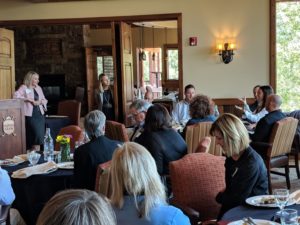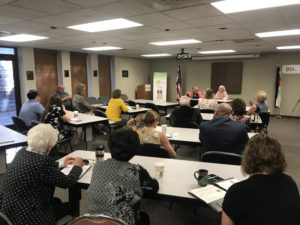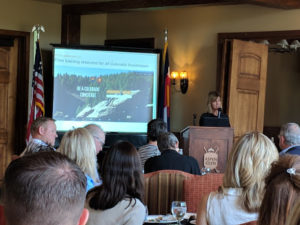In this Capitol Report:
Colorado Chamber on Tour: Demonstrating the Power of Unity for Business
 The Colorado Chamber went on tour this month for a series of programs organized in partnership with leaders of local chambers in communities throughout the state. The mission was to hear what priorities, concerns and issues are affecting business throughout the state, share news from the legislature with business leaders, and host the Colorado’s top experts on the state’s population trends and tourism industry.
The Colorado Chamber went on tour this month for a series of programs organized in partnership with leaders of local chambers in communities throughout the state. The mission was to hear what priorities, concerns and issues are affecting business throughout the state, share news from the legislature with business leaders, and host the Colorado’s top experts on the state’s population trends and tourism industry.
An overview of the programs is below:
- August 28, the Colorado Chamber joined the Colorado Springs Chamber of Commerce & EDC for their Board of Governors meeting at the Pinery in Colorado Springs with guest speaker, Elizabeth Garner, Colorado’s state demographer.
- September 12, the Colorado Chamber joined the Aspen, Basalt, Carbondale and Glenwood Springs Chambers of Commerce at the Aspen Glen Club in Carbondale with guest speaker, Cathy Ritter, Colorado Tourism Office director.
- September 13: the Colorado Chamber joined the Grand Junction Chamber of Commerce at their headquarters for a public discussion of legislation and issues affecting business on the Western Slope and around the state in advance of the Grand Junction Chamber’s Public Policy committee meeting.
Loren Furman, the Colorado Chamber’s Senior Vice President for State  and Federal Relations, delivered a 2019 legislative briefing at all three venues. She was joined by Rachel Beck, Vice President of Government Affairs at the Colorado Springs Chamber & EDC, and Diane Schwenke, President and CEO of the Grand Junction Chamber of Commerce. Together, these chamber leaders demonstrated how important the business community’s involvement is to protecting Colorado’s economy and business environment.
and Federal Relations, delivered a 2019 legislative briefing at all three venues. She was joined by Rachel Beck, Vice President of Government Affairs at the Colorado Springs Chamber & EDC, and Diane Schwenke, President and CEO of the Grand Junction Chamber of Commerce. Together, these chamber leaders demonstrated how important the business community’s involvement is to protecting Colorado’s economy and business environment.
While the 2019 legislative session presented many challenges for business, Furman and our chamber partners demonstrated the strength of the business community when we all work together and make our voices heard. This was established primarily through the success seen by the business community when a coalition of more than 80 chambers of commerce and business leaders were able to stop a one-size-fits-all, state-mandated family and medical leave bill from becoming law before a massive government program was created – one that would have cost employers and employees more than $1 billion to administer.
Furman and the chamber leaders emphasized the impact that business owners and leaders have when they personally get involved through phone calls and emails to their legislators, as well as joining the public conversation through social media, letters to the editor and by testifying at the state capitol or by remote testimony.
At the closing of the tour, we are pleased to report that Rep. Dylan Roberts has been a champion for establishing two additional locations for remote testimony at Colorado Mountain College campuses in Edwards and in Glenwood Springs. While the Executive Council of the Colorado General Assembly needs to give final approval the new sites, chamber leaders and Rep. Roberts anticipate the sites will be online for the 2020 legislative session.
At the Colorado Springs program, Elizabeth Garner presented an update on population trends that are affecting Colorado business today and that may impact business in the future. Some key take-aways were that Colorado ranks number seven among the states with the highest population growth, but in spite of perceptions of rapid growth, Colorado is actually on pace with past trends and is even slowing. Our state is predominantly young (ages 20-50) but aging quickly due to longer lifespans and slowing birth rates – an indicator of a future shortage of employees. And while highly skilled workers immigrate to our state, Colorado exports as many of these employees at an equal rate.
 And at the Carbondale event, Cathy Ritter presented an update on Colorado’s tourism competitive advantage. Some key findings were that tourists value Colorado’s commitment to sustainability, and that this influences their choice of travel and vacation destinations. The state has invested heavily in marketing in preparation for retaining our competitive edge in times of economic downturn.
And at the Carbondale event, Cathy Ritter presented an update on Colorado’s tourism competitive advantage. Some key findings were that tourists value Colorado’s commitment to sustainability, and that this influences their choice of travel and vacation destinations. The state has invested heavily in marketing in preparation for retaining our competitive edge in times of economic downturn.
Deadline of Sept 25th for Public Comments on Mandated Paid Family Leave Program & Details on Next Task Force Meeting
This week, the Task Force (TF) held a phone conference meeting to resolve voting methods, role of the actuary, and the process for finalizing their report. They reached an agreement as follows:
- TF wants the final report to reflect the diversity of opinions and relative support for each of the 16 topics outlined in the 2019 legislation creating the Task Force and responsibilities. They will proceed to to the next topic when 8 votes are secured. If no threshold of 8 votes is achieved, i.e., 5-5-3, they will document each of the opinions. Any TF member will have the ability to document their viewpoint in the final report. Motion approved by 12 votes (1 absent).
- The TF will want the actuary’s support in understanding the impact of each of the topics so that they can craft ranges and recommendations that are implementable.
- The CO Dept of Labor & Employment (CDLE) staff will use meeting minutes and TF submissions to craft draft the report, however CDLE will rely on editing by the TF since this is indeed their product – not the product of the CDLE.
Details on Upcoming Task Force Meeting:
Date: 9/26/19
Time: 10:00 a.m.
Location: CO Department of Labor & Employment, 633 17rh St., 12th Floor Conf room, Denver.
View the agenda here
Reminder! Deadline for submitting public comments on how a state mandated family leave program will impact you or your business are due by September 25th! Comments can be submitted @ https://sites.google.com/state.co.us/famli/public-comment.
Remaining Task Force deadlines:
- September 25th: public comments
- October 1: CDLE Third-Party Study, CDPHE Report, Expert Reports, and Public Comments
- November 1: Initial recommendation from the task force due to the actuarial firm
- December 1: Actuarial firm delivers its analysis to the task force
- January 8: Task force reports its final recommendation
Please contact Loren Furman at [email protected] or at 303-866-9624 with any questions/concerns regarding this matter.
Employer Feedback Needed on Proposed Changes to Minimum Wage Order
- Should Colorado implement a minimum salary required to be paid to employees covered by the exemptions in Section 5 of the Minimum Wage Order? If so, what should that minimum salary be? Should there be an adjusted salary threshold based on a large versus small business?
- Should alternatives be considered based on certain types of industries?
- How could there be a more simplified process between the Federal and State rules?
- Since the Colorado Minimum Wage Order 35 regulates four industries: (1) Retail and Service; (2) Food and Beverage; (3) Commercial Support Service and (4) Health and Medical, should the categories of covered employees in Section 1 of the Minimum Wage Order be expanded to other industries?
- A smaller stakeholder meeting will be convened at the beginning of October so please contact Loren Furman at [email protected] if you like to attend.
- Division staff will review all public comments and start the rulemaking process in November 2019. An emergency rule will likely be issued in order to comply with existing statutory requirements;
- Staff will continue to work with stakeholders on final rulemaking language through 2019 and the beginning of 2020.
